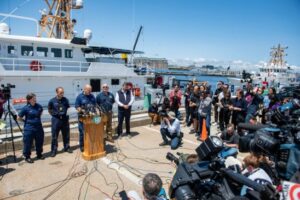The deadly voyage of OceanGate Expeditions’ Titan submersible has raised plenty of questions, including who should payfor extreme search and rescue missions? The U.S. Coast Guard is mum on how much it spent looking for the Titan and its five passengers, saying the agency “does not associate cost with saving a life.” Other searchers, however, are torn: Some worry that charging for rescues will deter those who need help from seeking it, while others say not doing so incentivizes adventurers — many of them wealthy — to take more risks.
- OceanGate employees could face criminal liability in the deaths of the Titan’s passengers, but questions about jurisdiction could complicate the case, Bloomberg reports.
By Saundra Latham, Editor at LinkedIn News
Titan Submersible Disaster Probes Face Tricky Test of Criminal Liability
US and Canadian officials are looking into what went wrong in a commercial deep-sea adventure and whether crimes were committed that led the Titan submersible to implode and kill all five people aboard.
The probes into the Titan disaster, which occurred in international waters on June 18, may be complicated by questions of which country should take the lead, and by doubts that the 22-foot (6.7-meter) watercraft fits the legal definition of a maritime vessel. With the death of the chief executive officer of the submersible company who was on board, potential criminal liability could fall on OceanGate’s other employees, operations managers or inspectors.
The US Coast Guard announced that it will pursue its highest level of investigation after a search and rescue mission turned up debris of the submersible on the ocean floor near the Titanic wreck in the North Atlantic. The probe will examine “accountability aspects” of the implosion, Coast Guard Captain Jason Neubauer said at a Sunday press conference in Boston, adding that it may result in “recommendations to the proper authorities to pursue civil or criminal sanctions, as necessary.”
Canada’s Transportation Safety Board launched its own inquiry as pieces of the submersible, owned and operated by US-based OceanGate, continue to be collected in the port of St. John’s, Newfoundland.
“If I was representing anybody that has anything to do with this thing, and they were US citizens or based in the US, I would be jumping up and down saying, ‘You need to lawyer-up immediately and get a real good analysis of what the potential liability could be,’” said George Chalos, a maritime defense lawyer.
“A criminal prosecution is viable – that’s an easy answer,” he said. “The question is where?”
OceanGate didn’t respond to a call or email seeking comment.
Legal experts have said safety concerns raised about the submersible before the implosion offer evidence of gross negligence that could give rise to civil suits filed by the families of the passengers. If the negligence was severe enough for the US Justice Department to pursue a criminal case, it would likely be brought under the Seaman’s Manslaughter Statute.
The law, dating to the 1800s, can target a ship’s officers, engineers and pilot, and can also extend to the owners, inspectors and managers of the company that operates the vessel. Although there’s a relatively low bar for establishing criminal responsibility under the law, any US prosecution would first require establishing jurisdiction.
OceanGate is based in Everett, Washington. Its submersible was registered in the Bahamas. The Titan was deployed by a Canadian ship, the Polar Prince, from St. John’s to international waters in the Atlantic over the wreckage of the Titanic.
OceanGate’s Chief Executive Officer Stockton Rush, 61, who piloted the Titan, was American; the other passengers were from Pakistan, France and the UK. French and British officials are also investigating.
Guillermo Söhnlein co-founded Oceangate with Rush in 2009. He served as the company’s CEO, expedition leader, and sub pilot, he said in a Facebook post Thursday. He left the company in 2013, but still remains a minority equity owner.
Söhnlein didn’t respond to a request for comment.
One of the five killed was Rush. Also on board were Hamish Harding, the billionaire British founder of a private equity company, Shahzada and Suleman Dawood, a father and son in one of Pakistan’s wealthiest families, and Paul-Henri Nargeolet, a renowned French diver.
“Even though it feels like a US operation, when you start to look at all the elements there may not be enough for a prosecution,” said Martin Davies, director of the Maritime Law Center at Tulane University. “If you ask me what country most clearly has jurisdiction, it’s Canada.”
On Saturday, Canadian investigators from the Transportation Safety Board were dispatched to St. John’s to gather information and conduct interviews, the agency said. The Royal Canadian Mounted Police confirmed that it’s determining whether a criminal investigation is warranted but declined to comment further.
Another important question for any US case is whether OceanGate’s Titan fits the definition of a “vessel” under maritime law for wrongful deaths. Legal experts are dubious, pointing in part to the fact that the submersible couldn’t navigate the ocean’s surface.
“If it’s not a vessel, you don’t get it under the Seaman’s Manslaughter act,” Chalos said.
The definition came up in a US criminal trial stemming from the 2010 Deepwater Horizon oil spill in the Gulf of Mexico, in which BP Plc agreed to pay $4 billion as part of a plea deal involving 14 criminal counts — 11 of them for felony manslaughter. A federal appeals court rejected US prosecutors’ attempt to shoehorn criminal charges against two BP employees under the Seaman’s Manslaughter Statute, finding that they were operating a drilling rig, which later exploded, and not a vessel.
Chalos said the court’s ruling “demonstrates how it’s not just a catchall for anything that has a salty flavor.”











